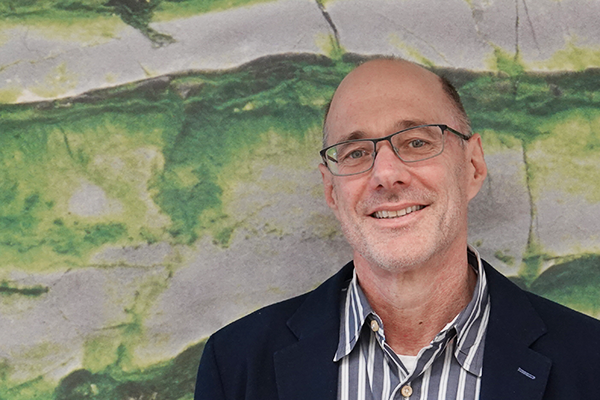
Meet the Program Director: Dr. Charles Werth
Dr. Charles Werth is a new ARPA-E Program Director. His research prior to joining ARPA-E focused on the intersection of mass transport, fluid flow, interfacial and geo-chemistry, redox reactions, microbial physiology, and material science for the development of sustainable water treatment, groundwater remediation, and geological carbon sequestration technologies.
What brought you to ARPA-E?
I came to ARPA-E because of the opportunity to help advance early-stage technologies that address water-energy challenges. I’ve worked on research related to water supply and treatment for most of my career, and I have a strong interest in how water impacts energy use and vice versa. As an academic, however, I was more focused on fundamental research than technology development and commercialization. ARPA-E presents an entirely new challenge and opportunity to think about moving research to the next level, and to have a more direct impact on water-energy challenges. I think addressing these challenges is particularly important because many cities in the U.S. are struggling to provide clean water economically. Also, we expect energy demands for water supply and treatment to grow with increasing water scarcity as we treat and use increasingly compromised or distant water sources. Additionally, I came to ARPA-E to learn about and contribute to the development of new technologies for other energy challenges, including carbon sequestration and subsurface resource recovery.
Tell us about your background.
I received my graduate training in environmental engineering, focusing on physical and chemical processes that affect the reactive transport of pollutants in groundwater. After graduating, I entered academia, and have been a professor for the past 27 years, first at the University of Illinois at Urbana-Champaign and since 2014 at the University of Texas at Austin. My interests have expanded since graduate school, and I’ve guided interdisciplinary research projects that focus on sustainable water treatment, groundwater remediation, and geological carbon sequestration. Most of my research has been funded by federal agencies, including the DOE, DOD, NSF, EPA, and USGS. I’ve advised 27 Ph.D. students who graduated and went on to careers in academia, industry, and consulting. I’ve served on a number of review and advisory panels. Among them, I served on the U.S. EPA Science Advisory Board from 2014-2017, where I enjoyed contributing to addressing environmental challenges at the intersection of science and policy. I also served as a Chief Editor for the Journal of Contaminant Hydrology from 2014-2023, where I enjoyed helping to expand the journal scope and broadening my exposure to great research.
How does your past work drive your current work supporting ARPA-E’s mission of developing entirely new ways to generate, store, and use energy?
In my prior work on water and wastewater treatment, I learned that energy represents a large fraction of treatment costs, and that wastewater contains many valuable materials that we remove during treatment for disposal. This drives my efforts to develop a new program area on innovative technologies to recover high energy-value materials from wastewater. In my prior work on geological carbon sequestration, I learned about mechanisms that affect the flow, transport, and reaction of various fluids in deep subsurface formations, including CO2, hydrocarbons, and hydrogen. This motivates and informs my efforts to contribute to programs in carbon capture, storage, and subsurface resource recovery.
What’s it been like to work at ARPA-E now that you’ve got a few months under your belt to reflect?
Working at ARPA-E has been great. My colleagues are engaged, smart, and supportive. They have very different backgrounds, and I’m learning about so many new energy challenges and technologies from them. To build my first ARPA-E research program, I’ve been engaging with lots of different people. This includes engineers and scientists, as well as CEOs, CTOs, and Technology-to-Market experts. These engagements have broadened my perspective and knowledge of energy challenges and possible solutions and are helping me better understand the bottlenecks that can derail technology commercialization.
In what innovative ways would you like to explore carbon sequestration technologies and mitigating the environmental impacts of energy production?
Carbon sequestration technologies are advancing at an amazing pace. Last year, the DOE announced $1.2 billion for development of two commercial-scale direct air capture facilities. Despite these advancements, carbon sequestration technologies are still in their infancy. We need early-stage applied research to discover new materials and material properties that will enable us to more selectively sequester CO2 from air and other mixed gas streams, and we need new and less energy-intensive processes to permanently store CO2. I look forward to working with my colleagues at ARPA-E to identify and support projects that target the most promising materials and processes to address these fundamental challenges.
What new program areas or technical whitespaces are you interested in exploring?
I’ve been working in water my entire adult life and am interested in substantially decreasing energy demands and carbon emissions associated with water supply and treatment. As I mentioned earlier, my first efforts at ARPA-E are focused on developing a new program on high energy-value materials recovery from wastewater, where wastewater is broadly defined to include municipal, animal, industry, and reverse osmosis concentrate sources. Two other areas I’m interested in are electrification of chemical oxidation technologies in water and wastewater treatment and using artificial intelligence for long-range water planning. The latter area would have broad implications for how municipalities and cities plan for future water resources and treatment, and could have immense energy implications when cities have to choose between pumping a cleaner source water from further away or treating a more compromised source water closer to home.
What do you hope to accomplish during your tenure at ARPA-E?
I hope to lead development of at least a few new programs at the water-energy nexus. I hope to oversee other diverse energy recovery and carbon emissions reduction projects, and to help guide applied research efforts that lead to new cutting-edge technologies and commercialization. I hope to make friends, have fun, and learn what makes or breaks commercialization efforts of new technologies across the energy space.
